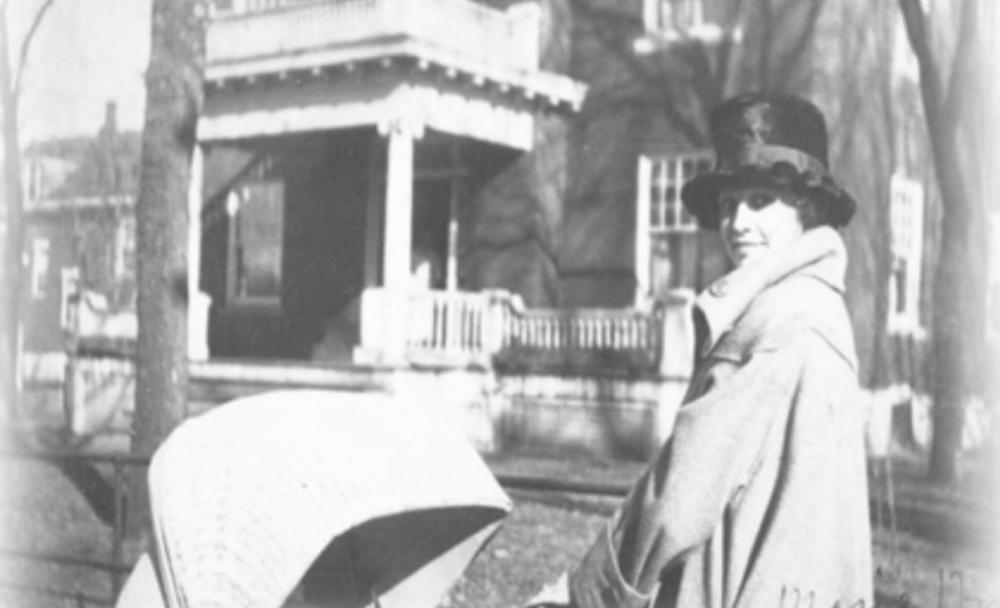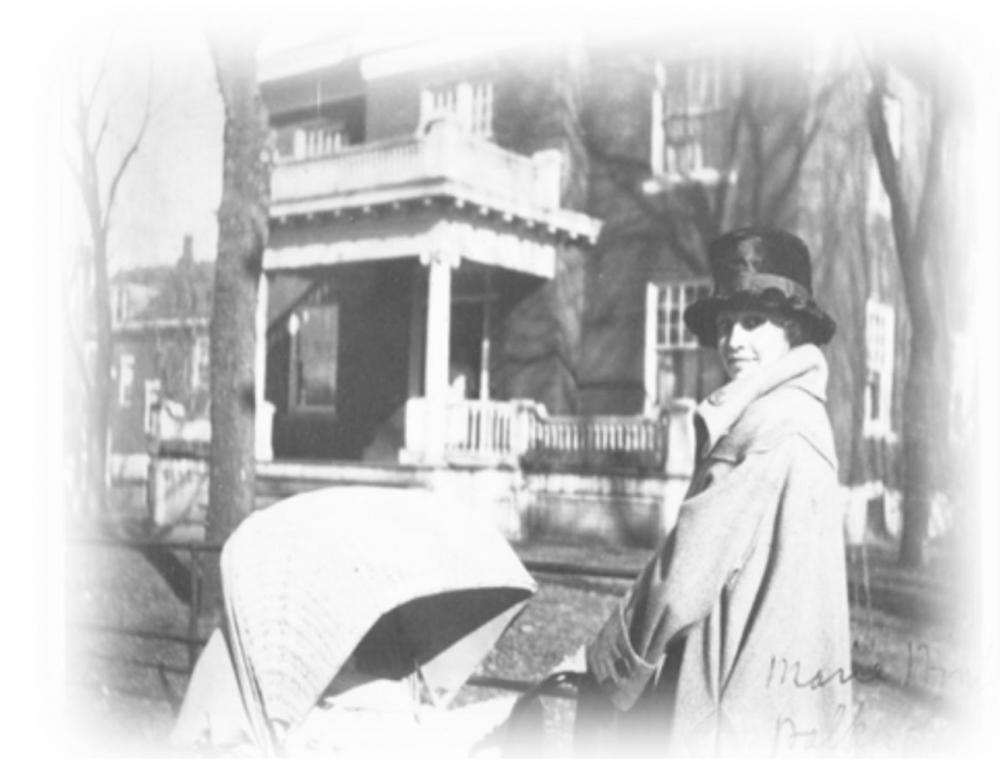Editor’s note: Sometimes it seems magical. At times we need it most, an image and a memory will arise mysteriously, and the experience of a past generation will nurture us, soothing today’s anxiety. In this brief personal essay, Carolyn Sherman shares the experience. Without wasting a word, we feel what she feels, through the gift of good storytelling.
Today as I clicked out of CNN to escape the latest bad news, my grandmother’s picture popped up onto my computer screen. What strange key did I hit now? If my computer skills weren’t so all over the map, I’d wonder if she wasn’t somehow trying to get in touch.
Goggy is 22 years old here, smiling out from beneath a hat that looks a bit on the goofy side now but was probably all the rage in 1919. Standing by her grandfather’s house, she’s pushing a baby carriage. Her smile is tentative as she gazes sideways at the picture taker, an instant caught in time, when she is young and beautiful and stylish, her baby, my mother, a world of possibility.
I remember her face so differently. Who is this young person?
World War I had just ended; the Depression was yet to come. As I look at the picture, I slowly recognize the face I loved so many years ago. I remember her smile—not a hearty smile, but a cheerful one. Cheerful she was, all her life. And resourceful, and tough.
When the Depression wracked the nation, she turned the home in the picture into The Blue Parrot Tearoom, graciously serving cucumber sandwiches and cream puffs to all comers and saving her family. When my mother divorced and moved my brother, Pete, and me to St. Louis to find work, Goggy came with us.
Life was harsh, unlike her easy life growing up, the granddaughter of the judge and the daughter of the longtime mayor of Springfield, Missouri.
I see her shoveling coal into the furnace of our South St. Louis flat, orange flames scorching her face. Or she and I are pulling steaming shirts through the wringer in that dark basement, laughing and reciting “The Three Little Kittens” as we shout triumphantly together, “And you shall have no PIE!”
Returning to college one Christmas, I lugged onto the train a trunk containing every skirt, sweater, shoe, curler, bra, and party dress that I owned, and my new winter coat. When I got off, the trunk was gone. I called my mother from a pay phone, sobbing.
Goggy took the phone. “Honey, it’s just stuff. I know it’s hard. But save your tears for the things you can’t replace. You’ll be fine.” And I was. Two days later, in fact, the trunk appeared, having been unloaded by mistake in Gary, Indiana.
The Apple Geniuses could no doubt explain in nerdy terms why this picture appeared on my screen unbidden. I prefer to think that Goggy is still here for me, just as she was when I was six and our dog Blackie died and she held me, and I thought nothing could ever be fine.
My son calls later that day, in despair like so many over our country’s future. “Mom, are we going to be okay?”
Goggy, transcending time and technology, sends the words to comfort her beloved great-grandson.
“You bet, honey,” I say. “We’ll be fine.”
Maryland writer Carolyn Sherman has published in The Washington Post, worked as an editor for Paulist Press and the National Catholic News Service, and served as vice president of The Murawski Group, teaching business writing to clients from Coca-Cola, to Starbucks, to the National Academies of Science. She is now focusing on the writing she’s always wanted to do, essays and memoir.
“Delmarva Review” publishes the best of original new nonfiction, poetry, and short stories selected from thousands of submissions annually. The independent, nonprofit literary journal is supported by individual tax-free contributions and a grant from the Talbot County Arts Council with funds from the Maryland State Arts Council. The print edition is available from Amazon.com and Mystery Loves Company, in Oxford. Website: DelmarvaReview.org.




Wendy Ingersoll Perry says
Charming essay!